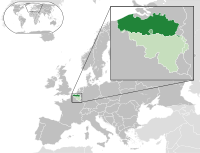Flemish Community
|
Flemish Community Vlaamse Gemeenschap (Dutch) |
||||
|---|---|---|---|---|
| Community of Belgium | ||||
|
||||
|
||||
| Country | Belgium | |||
| Established | 1980 | |||
| Capital | Brussels | |||
| Government | ||||
| • Executive | Flemish Government | |||
| • Governing parties (2014–2019) | N-VA, CD&V, Open Vld | |||
| • Minister-President | Geert Bourgeois (N-VA) | |||
| • Legislature | Flemish Parliament | |||
| • Speaker | Jan Peumans (N-VA) | |||
| Population | ||||
| • Total | ±6,450,000 | |||
| Celebration Day | July 11 | |||
| Language | Dutch | |||
| Website | www.vlaanderen.be | |||
The term Flemish Community (Dutch: Vlaamse Gemeenschap [ˈvlaːmsə ɣəˈmeːnsxɑp]; French: Communauté flamande; German: Flämische Gemeinschaft [ˈflɛːmɪʃə ɡəˈmaɪ̯nʃaft]) has two distinct, though related, meanings:
State reforms in Belgium turned the country from a unitary state into a federal one. Cultural communities were the first type of decentralisation in 1970, forming the Dutch, French and German Cultural Community. Later on, in 1980, these became responsible for more cultural matters and were renamed to simply "Community", the Dutch (Cultural) Community also being renamed to the Flemish Community. In the same state reform of 1980, the Flemish and Walloon Region were set up (the Brussels-Capital Region would be formed later on). In Flanders it was decided that the institutions of the Flemish Community would take up the tasks of the Flemish Region, so there is only one Flemish Parliament and one Flemish Government.
Under the Belgian constitution, the Flemish Community has legal responsibility for the following:
As the Flemish Community's institutions (parliament, government and ministry) absorbed all competencies of the Flemish region, they became also competent for all regional policy areas, including:
Members of the Flemish Parliament elected in the Brussels-Capital Region have no right to vote on Flemish regional affairs, only on community affairs, since affairs concerning their region are governed by the Brussels Parliament. Legally speaking, in the region of Brussel-Capital, the Flemish Community is responsible not for individual people but for Flemish institutions such as schools, theatres, libraries and museums. The reason is that no distinct sub-national status exists in Belgium. Yet, individuals living in Brussels can opt by their own choice for certain policies of the Flemish Community.
...
Wikipedia




